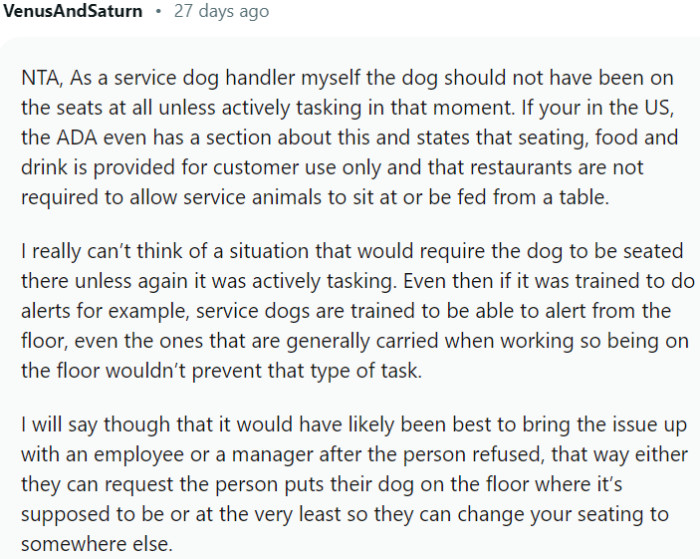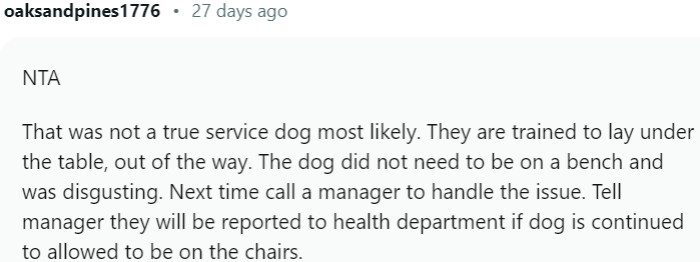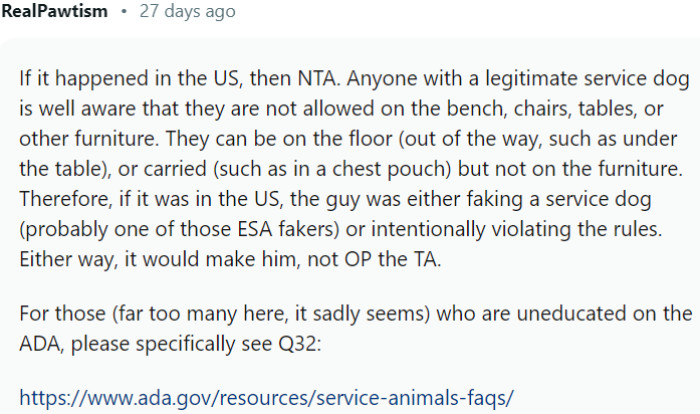Redditor Asks If It Is Acceptable To Request That A Service Dog Owner Take His Dog Further Away
Service dogs play an essential role in the lives of many individuals with disabilities. These specially trained animals assist their owners with various tasks, from opening doors to detecting seizures.
However, sometimes, service dog owners can exhibit unreasonable behavior. Some service dog owners may fail to acknowledge the boundaries of others when it comes to their dogs.
They may not realize that not everyone is comfortable around dogs, even service dogs. Additionally, they may disregard other people's requests to keep their dogs under control, whether it is because of fear, allergies, or personal space issues.
In some cases, service dog owners may also disregard established guidelines for service dogs. For example, service dogs should be trained to be calm and well-behaved in public places.
However, some owners may allow their dogs to misbehave or ignore their dogs' disruptive behavior, such as barking or jumping on people. Such behaviors by service dog owners can lead to negative experiences for both the owners and their dogs.
They may create conflicts and misunderstandings with other people, and they may even undermine the public perception of service dogs and their purpose. Service dog owners must understand the importance of responsible behavior and proper training for their dogs.
They should also be aware of the rights and needs of other people and ensure that their dogs do not pose any risks or discomfort to them. By being respectful and considerate, service dog owners can ensure that their dogs are helping to make a positive impact in the community.
OP went to a busy restaurant with three friends and sat next to a man with a service dog on the bench. OP asked the man to keep his dog off the bench, but he refused.
OP got frustrated, argued with the man, and left the restaurant. Their friends were unhappy with the situation, and OP wondered if they acted poorly.
I asked the guy if he could keep his dog on the ground

I had made a mini scene and just removed myself from that situation

Trained dogs do not have problems getting under the owner's chair

Understanding Service Dog Etiquette
The presence of service dogs in public spaces has become more common, yet misconceptions about their roles persist. According to Dr. Paul Bloom, a psychology professor, "Service dogs are not just pets; they are trained companions that provide essential support to individuals with disabilities." This highlights their vital role in their handlers' daily lives. However, it's essential for the public to understand the etiquette surrounding service dogs to ensure a respectful and accommodating environment. Misunderstandings can lead to discomfort for both the service dog owner and those around them, emphasizing the need for increased awareness and education on this topic.
Understanding Service Animal Dynamics
The discomfort expressed by the individual regarding the service dog highlights a common misunderstanding about the role of service animals in public spaces. Research indicates that service animals play crucial roles in supporting individuals with disabilities, including emotional support. According to Dr. Karen Overall, a veterinary behaviorist, service dogs are trained to mitigate their handler's disability, and their presence can significantly enhance the quality of life.
Recognizing this can help individuals better understand the importance of allowing service animals to accompany their owners in public settings.
Understanding Service Dog Etiquette
Service dogs play a crucial role in supporting individuals with disabilities, and understanding their presence is vital for fostering a compassionate community. According to Dr. Barry Schwartz, a choice researcher, “Awareness of the rights and needs of service dog owners is essential to reduce misunderstandings and promote a more inclusive environment.” This highlights the need for education around service dog etiquette and the responsibilities of both owners and the public. Awareness of the purpose and training of service dogs can help alleviate fears and promote acceptance in shared spaces.
Understanding Service Animal Etiquette
Service animals play a crucial role in supporting individuals with disabilities, and understanding their importance is vital for fostering an inclusive environment. Research from the American Disability Association underscores the legal and ethical obligations surrounding service animals, including the need for respect and accommodation in public spaces.
Being uncomfortable around a service dog can stem from a lack of understanding about their role and the training they undergo to assist their owners.
It is understandable to prefer not to eat in places where pets are present and unknown.

It may have been better to involve an employee or manager after the person refused to move their service dog

Service dog most are trained to lay under the table

Moreover, the discomfort felt by individuals around service dogs often stems from a lack of familiarity and understanding of their purpose. Research in social psychology suggests that anxiety in these situations can lead to avoidance behaviors, which ultimately perpetuates stigma around disabilities. By educating the public on the importance of service dogs and the impact they have on their owners' lives, we can foster a more inclusive environment.
Encouraging open dialogue about service animals can help alleviate discomfort and promote understanding.
Furthermore, the psychological concept of social norms plays a significant role in how individuals perceive and interact with service animals. A study published in the Journal of Social Issues highlights that societal attitudes towards service animals can vary widely, often leading to stigma or misunderstanding. Educating the public about the rights and responsibilities of service animal handlers can create a more supportive environment for everyone involved.
Promoting awareness can foster empathy and reduce conflicts in public spaces.
Additionally, it's important to address the psychological impact of anxiety on both service dog owners and the general public. According to a study published in the Journal of Anxiety Disorders, individuals with anxiety often feel heightened stress in social situations, particularly when encountering service animals. This suggests that creating a supportive environment that respects the needs of both service dog owners and those who may feel uneasy around them is crucial.
Encouraging open conversations about these feelings can foster understanding and reduce stigma surrounding anxiety and service animal usage.
This situation emphasizes the need for education around service animals and the rights of their handlers. Studies show that increased awareness of service animal laws can reduce stigma and promote acceptance in public spaces.
When individuals understand that service dogs are specifically trained to assist people with disabilities, it can foster a more compassionate response rather than a fearful one.
Anyone with a legitimate service dog is well aware that they are not allowed on the bench, chairs, tables, or other furniture

I have never in my life seen a service dog in a restaurant sitting on furniture

It shouldn't impeding others

Strategies for Navigating Service Dog Interactions
For those who feel uncomfortable around service dogs, practical strategies include focusing on the handler rather than the dog. A study published in the Journal of Applied Psychology indicates that maintaining eye contact and engaging with the handler can help bridge the gap of discomfort. This approach not only respects the service dog's role but also acknowledges the individual's needs.
Additionally, practicing mindfulness techniques can help individuals manage their anxiety in these situations, allowing for more positive interactions.
Navigating Personal Boundaries
The individual's request for the service dog owner to move further away touches on the important issue of personal boundaries. Dr. Brené Brown’s research emphasizes the need for clear boundaries in maintaining healthy relationships. When boundaries are respected, individuals can feel more secure and comfortable in their interactions.
Communicating personal boundaries assertively and respectfully can lead to more positive interactions and reduce discomfort for all parties involved.
Promoting Understanding and Compassion
Promoting understanding between service dog owners and the public is essential for creating a harmonious environment. Experts recommend community education initiatives that inform the public about the importance of service dogs and the rights of their owners. Research shows that when communities are educated about disability rights, inclusivity increases, leading to a more supportive atmosphere for everyone involved.
Such initiatives can include workshops, informational pamphlets, or community discussions that encourage dialogue about the role of service animals in society.
The Psychological Impact of Service Animal Misunderstandings
Misunderstanding the presence of service animals can lead to increased anxiety for both the handler and the public. Research in social psychology suggests that fear of the unknown often drives negative responses to situations involving service animals.
Addressing these fears through education and awareness can help create a more supportive environment for individuals with disabilities.
Animals are still animals, even service animals

The restaurant should arrange a table for them separately to ensure their comfort

Ask someone else to sit next to your dog while they eat is unacceptable

Ultimately, fostering understanding and respect for service dogs and their handlers is crucial. Public awareness campaigns can play a vital role in educating individuals about the responsibilities and rights of service dog owners. As Dr. Angela Duckworth, a renowned character researcher, states, "When we cultivate understanding in our communities, we empower individuals with disabilities to thrive." Informed communities are more likely to create supportive environments for individuals with disabilities, as highlighted on her website angeladuckworth.com.
Encouraging inclusivity and understanding can lead to a more compassionate society.
Moreover, understanding the role of empathy in these situations can significantly enhance interpersonal interactions. Dr. Daniel Goleman outlines how empathy allows individuals to connect with others’ experiences, leading to more compassionate responses. When individuals practice empathy, they become more attuned to the needs of others, which can facilitate understanding and cooperation.
Encouraging empathetic interactions can help bridge gaps between differing perspectives.
Furthermore, strategies for managing discomfort in shared spaces are valuable for everyone involved. Techniques such as mindfulness can help individuals cope with anxiety when encountering service dogs. Studies suggest that practicing mindfulness can reduce anxiety levels and promote a sense of calm in stressful situations, ultimately benefiting both the individual and those around them.
Encouraging individuals to practice mindfulness techniques can create a more peaceful atmosphere in public spaces.
In this case, the discomfort expressed by the individual highlights a common challenge faced by service dog handlers. A clinical psychologist notes that negative reactions from the public can exacerbate feelings of isolation and anxiety for those who rely on service animals.
Promoting understanding and empathy toward service animal handlers can mitigate these effects and foster a more inclusive community.
It is important to acknowledge that trained service dogs should not be causing disruption or impeding others' comfort, and most service dogs are trained to remain under the table. It is also understandable that some individuals may prefer not to eat in places where pets are present and unknown, but it is important to note that service animals are not considered pets and are allowed in public places under the law.
However, service dog owners should be aware of their dogs' behavior and ensure that they do not interfere with the comfort of others. In this particular case, it may have been more appropriate for the OP to involve an employee or manager in the situation after the owner of the service dog refused to move it.
It is not acceptable to ask someone else to sit next to their dog while they eat, as it is not fair to others. Overall, the restaurant should make every effort to accommodate the needs of all customers, including those with service animals.
Providing a separate table or seating area for individuals with service dogs can help ensure their comfort while also respecting the needs of other customers. However, service dog owners must act responsibly and ensure that their dogs do not disrupt others or impede their comfort in public places.
Practical Solutions for Promoting Inclusivity
To foster inclusivity, public places can implement training programs for staff on service animal etiquette and the rights of handlers. Research suggests that staff who are educated about service animal laws can create a more welcoming environment, reducing misunderstandings and conflict.
These training sessions can also empower staff to address any discomfort among patrons in a way that is respectful and supportive.
Additionally, community outreach programs can help educate the public about the importance of service animals. Studies show that initiatives aimed at increasing awareness can lead to greater acceptance and understanding of individuals with disabilities and their service animals.
By fostering a culture of empathy and support, communities can enhance the quality of life for those who rely on service animals.
The Emotional Consequences of Negative Interactions
Negative interactions regarding service animals can have long-lasting emotional effects on handlers, reinforcing feelings of anxiety and vulnerability. Research published in the Journal of Social Issues indicates that individuals who face stigma and misunderstanding frequently experience heightened levels of stress and isolation.
This underscores the necessity for communities to cultivate understanding and support for individuals with disabilities and their service animals.
Psychological Analysis
This situation underscores the importance of understanding the role of service animals in supporting individuals with disabilities. The discomfort expressed by the individual reflects a common lack of awareness that can lead to unnecessary tensions in public spaces.
Encouraging education and empathy surrounding service animals can foster a more inclusive atmosphere, benefiting both handlers and the broader community.
Analysis generated by AI
Analysis & Alternative Approaches
In summary, promoting understanding and respect for service animals is essential for fostering an inclusive society. Research supports the need for education and awareness to reduce stigma and enhance the well-being of those who rely on service animals.
By creating supportive environments, communities can improve the quality of life for individuals with disabilities.
The Role of Empathy in Navigating Public Spaces
Empathy is a key component in understanding the experiences of others, especially in public settings. Research in the Journal of Social Psychology shows that cultivating empathy can lead to more compassionate interactions and understanding between individuals. Encouraging empathy in public interactions can help bridge the gap between service dog owners and those who may feel uncomfortable.
By fostering a culture of empathy, communities can become more inclusive and accommodating for all individuals, regardless of their circumstances.
Psychological Analysis
This situation illustrates the complexities of navigating public spaces with service animals. It's crucial for individuals to recognize the importance of empathy and understanding in creating a supportive environment for everyone.
Analysis generated by AI
Analysis & Alternative Approaches
In conclusion, fostering understanding and compassion for service dog owners is essential for creating inclusive environments. By promoting education, empathy, and effective coping strategies, communities can support both individuals with service dogs and those who may feel uneasy in their presence.
The Importance of Awareness and Education
Education plays a crucial role in dispelling myths and misconceptions about service animals. Dr. Mary R. Smith emphasizes that public awareness campaigns can significantly improve understanding and acceptance of service animals. By informing the public about the training and responsibilities associated with service animals, communities can foster more inclusive environments.
Such education can reduce anxiety for those uncomfortable around service animals and promote acceptance.
Additionally, exploring the psychological factors behind discomfort with service animals can provide insight into individual reactions. Research indicates that fear or anxiety around dogs can stem from past negative experiences or lack of exposure. Dr. Karen Overall’s studies suggest that gradual exposure to well-trained service animals can help alleviate fears and promote comfort.
Creating opportunities for positive interactions can be beneficial for everyone involved.
Promoting Inclusive Public Spaces
To create more inclusive public spaces, it’s vital to encourage policies that support the rights of service animal handlers. Research in social psychology demonstrates that inclusive policies can lead to greater acceptance of diversity in public settings. Dr. Robert Cialdini’s work on social influence indicates that when individuals see others respecting service animal rights, it can create a ripple effect of positive behavior.
Advocating for such policies can enhance the overall community climate and foster acceptance.
Ultimately, fostering understanding and respect around service animals can create a more harmonious environment for everyone. By promoting empathy, education, and clear communication, individuals can navigate their discomfort while also recognizing the essential roles service animals play in their handlers’ lives.
Psychological Analysis
This situation illustrates the importance of understanding the role of service animals in supporting individuals with disabilities. It's essential for individuals to recognize their rights and the necessity of these animals in public spaces. Creating open dialogues about discomfort can promote understanding and foster a more inclusive atmosphere.
Analysis generated by AI
Analysis & Alternative Approaches
In conclusion, the dynamics surrounding service animals and public interactions are complex and multifaceted. Understanding the importance of empathy, education, and personal boundaries can enhance the experiences of both service animal handlers and the public. By fostering a culture of respect and awareness, communities can create more inclusive environments.
Psychological Analysis
This situation highlights the complexities surrounding service dog etiquette and public perceptions. Understanding the role of service dogs is essential for fostering empathy and respect in social situations, ultimately benefiting everyone involved.
Analysis generated by AI
Analysis & Alternative Approaches
The growing presence of service dogs in public spaces underscores the need for greater understanding and respect for their roles. Research indicates that educating the public about service animals can help reduce stigma and discomfort. By fostering open dialogue and awareness, we can create more inclusive environments for all individuals.



